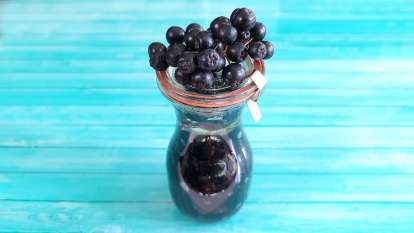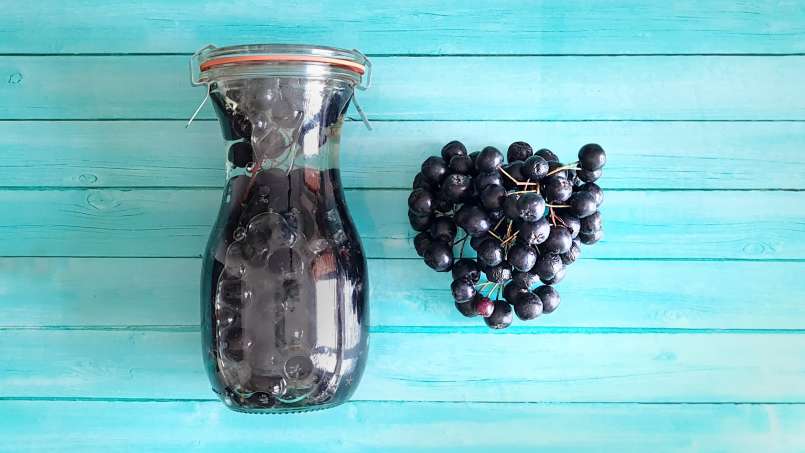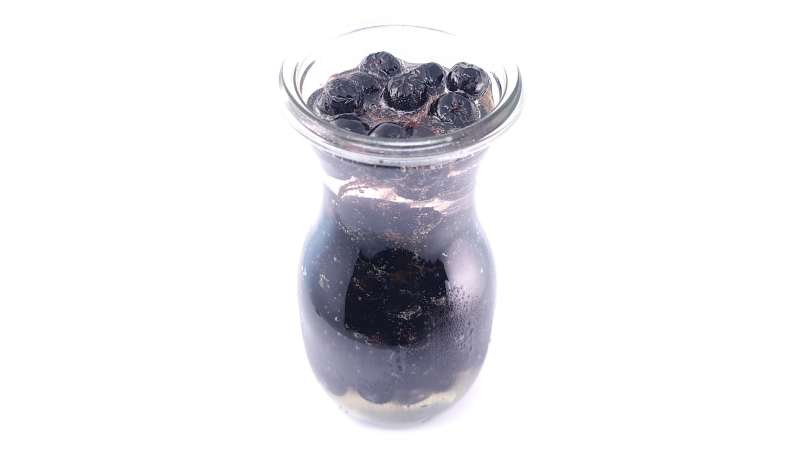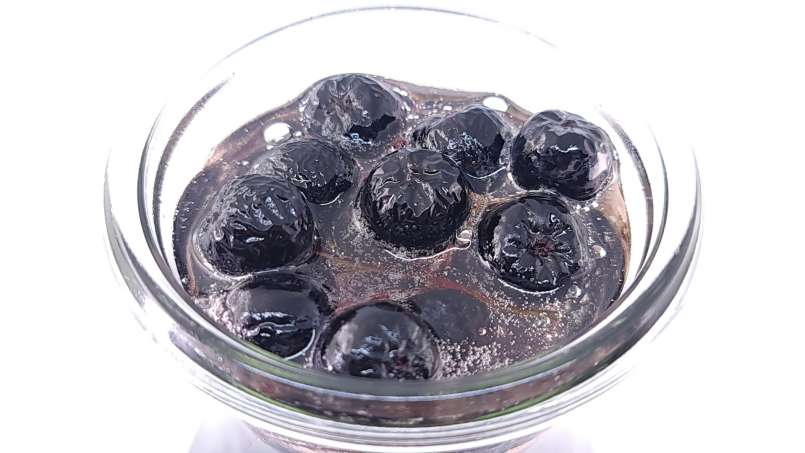Aronia bunches with honey in a jar
Preparation time3 min
Waiting time18 hours
Ready in18 h 3 m
A good way to preserve aronia for a long time
Aronia with bunches macerated in honey - a method of consuming aronia over long periods of time: tonic/energizing effect, immuno-stimulatory, supports the cardiovascular system, cognitive functions, liver function, helps vision, has an anti-inflammatory, antibacterial effect, being good for infections urination.
Servings: 10 servings
A ~300g jar, that's somewhere around 10 servings of a 30g serving (~1 tablespoon)
Ingredients
Estimated cost: 1.4 €
Materials
- recipients;
Preparation
 Wash the aronia/chokeberry bunche in 2-3 water, then let them dry on flat surfaces, possibly on kitchen towels. It is very important to remove the excess water, thus avoiding fermentation of the fruit.
Wash the aronia/chokeberry bunche in 2-3 water, then let them dry on flat surfaces, possibly on kitchen towels. It is very important to remove the excess water, thus avoiding fermentation of the fruit.
The aronia berries will not detach from the bunch, so they will last longer without losing their properties.
The honey must be as liquid as possible, possibly acacia, to crystallize as hard as possible. In a glass container (jar) we place the chokeberry fruits with all the bunches, without pressing them.
In a glass container (jar) we place the chokeberry fruits with all the bunches, without pressing them. Pour the honey over the aronia fruits, so that they are covered.
Pour the honey over the aronia fruits, so that they are covered. We close the jar hermetically and store it in cool places (4-10 degrees C), ventilated and protected from light (cellars or even in the refrigerator). It is recommended to stay like this, to macerate for at least 1 week, after which it can be consumed.
We close the jar hermetically and store it in cool places (4-10 degrees C), ventilated and protected from light (cellars or even in the refrigerator). It is recommended to stay like this, to macerate for at least 1 week, after which it can be consumed.
After opening, it will only be kept in the refrigerator until it is completely consumed.
The honey will thin out slightly, and as time goes by the aronia berries will raisin.
Administration
Only the syrup and aronia fruits will be consumed, the bunch part should be discarded.
We recommend 1 tablespoon (~30 g) 3 times a day, 30 minutes before meals.
We recommend 1 tablespoon (~30 g) 3 times a day, 30 minutes before meals.
Observations
We prefer a honey that is as liquid as possible and that, when cold, in the refrigerator, does not crystallize, or crystallizes more difficult, such as acacia honey.
I chose to use the aronia fruit with the bunch, because this way the fruit can last for a longer period of time.
Storage/Validity:
→ It is recommended to store in small (glass) containers, necessarily in cool places (4-10 degrees C), ventilated and protected from light (beaker or even in the refrigerator..
→ If unopened, a jar of aronia with honey can be stored in the refrigerator for up to 12 months.
→ After opening, it is recommended to consume within a maximum of 3 months and store only in the refrigerator.
I chose to use the aronia fruit with the bunch, because this way the fruit can last for a longer period of time.
Storage/Validity:
→ It is recommended to store in small (glass) containers, necessarily in cool places (4-10 degrees C), ventilated and protected from light (beaker or even in the refrigerator..
→ If unopened, a jar of aronia with honey can be stored in the refrigerator for up to 12 months.
→ After opening, it is recommended to consume within a maximum of 3 months and store only in the refrigerator.
Effects and benefits
General:
- important source of antioxidants: anthocyanins, flavonoids, phenolic acids;
- contains the highest level of anthocyanins and proanthocyanins;
- rich in vitamins: A, B, C, P, K and Q;
- rich in minerals: calcium, magnesium, potassium, iron, zinc and manganese;
- rich in carotene, lutein and catechin;
- tonic / energizing;
- the antibacterial effect;
- immuno-protective
- vitaminizing/mineralizing;
- source of fiber
- regulates the tension;
- regulates blood sugar;
- protects the stomach;
- anti-depressant;
- digestive;
- anti-diarrheal;
- detoxifying;
- anti-aging effect;
- hepato-protective;
- reduces stress;
- protects the body from intoxication;
Supports the immune system:
- strengthens the body's immunity (aronia being rich in vitamin C);
- prevents colds and flu (aronia are rich in ellagic acid and myricetin);
- prevents bacterial infections in the respiratory system;
Anti-tumor effects:
- reduces the risk of colon or breast cancer
- fight against free radicals;
- aronia inhibits the growth of cancer cells in colon cancer;
Supports the cardiovascular system:
- chokeberry helps regulate blood pressure due to its high potassium content, which has a dilating effect;
- helps prevent and even treat atherosclerosis;
- prevents coronary diseases;
- decreases the risk of myocardial infarction;
- effectively cleans the blood;
- reduces triglycerides and bad cholesterol (LDL);
Supports cognitive functions:
- helps increase neural activity;
- helps to strengthen neural connections;
- reduces oxidative stress in the brain (due to anthocyanins);
- prevents depression and anxiety, reduces stress;
- helps prevent neurodegenerative diseases (Alzheimer's, Parkinson's);
- prevents the risk of dementia;
- supports memory and improves learning processes;
Aids vision:
- supports eyesight, chokeberry being rich in carotene (lutein and zeaxanthin, flavonoid antioxidants present in chokeberry);
- prevents eye degeneration;
- reduces oxidative stress in the eyes;
- reduces inflammation in the eyes;
- prevents the development of cataracts;
- improves vision at night (anthocyanins improve micro-circulation and reduce capillary fragility);
Supports the digestive system:
- helps digestion, being rich in fiber;
- fights constipation;
- fights diarrhea;
- protects the intestines from bacteria;
- detoxifies the body;
- helps to lose weight (favors fat burning and increasing muscle mass);
Other:
- helps fight fatigue;
- prevents the sudden increase in blood sugar and keeps the sugar level under control, thanks to dietary fibers;
- prevents and fights allergies;
- contributes to the proper functioning of the liver;
- offers extra protection against UV radiation;
- recommended for those with rheumatism and joint pain (cyanidin and anthocyanin);
- prevents and treats urinary infections, thanks to quinic acid;
- reduces the development of E. coli bacteria and Staphylococcus aureus;
Side effects
- excessive consumption can in some cases lead to gastrointestinal disorders;
Contraindications
- for pregnant or breastfeeding women to consume only with the consent of the doctor;
- it is contraindicated for those with kidney stone problems, as aronia contains oxalic acid;
- for those with diabetes, a doctor's recommendation is necessary, and if you use honey, it should be acacia;
- it is not indicated for people with gastric/duodenal ulcer;
- attention for those with a high degree of coagulation, especially if they are going to have surgical interventions;




Comments